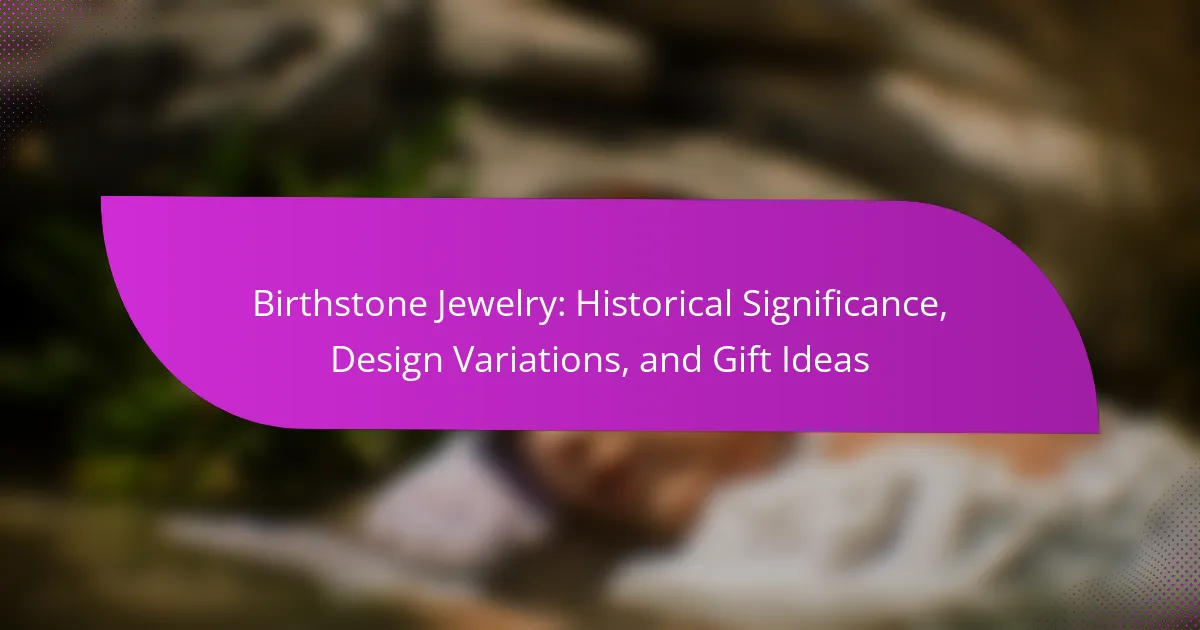Birthstone jewelry features gemstones that correspond to each month of the year, each believed to possess unique meanings and benefits. The tradition of birthstone jewelry, which dates back to ancient times, is rooted in historical texts such as the Bible, where twelve stones represented the tribes of Israel. This type of jewelry is available in various designs, including rings, necklaces, bracelets, and earrings, often crafted from materials like gold, silver, and platinum. Personalized options, such as custom engravings and combinations of multiple birthstones, enhance the sentimental value of these pieces, making them popular gifts for special occasions. The article will explore the historical significance, design variations, and thoughtful gift ideas associated with birthstone jewelry.

What is Birthstone Jewelry?
Birthstone jewelry is jewelry that features gemstones associated with each month of the year. Each birthstone is believed to have unique meanings and benefits. For example, January’s birthstone is garnet, symbolizing protection and strength. Birthstone jewelry is often given as personalized gifts to celebrate birthdays. This tradition dates back to ancient times, particularly in the Bible. The Book of Exodus mentions the twelve stones worn by Aaron, representing the twelve tribes of Israel. Today, birthstone jewelry includes rings, necklaces, and bracelets. It remains popular for both personal use and as meaningful gifts.
How is Birthstone Jewelry defined in different cultures?
Birthstone jewelry is defined as personal adornments featuring gemstones associated with an individual’s birth month. In Western culture, each month has a specific stone linked to it. For example, January is represented by garnet, while December is linked to turquoise. In Hindu culture, birthstones are connected to planetary influences and are believed to bring good fortune. The Vedic astrology system assigns specific stones to each zodiac sign, enhancing their metaphysical properties. In ancient Egypt, birthstones were believed to hold protective powers and were often used in amulets. This historical significance is reflected in modern practices where birthstone jewelry is often given as gifts to symbolize love and connection.
What historical significance do birthstones hold in various traditions?
Birthstones hold significant historical value across various cultures and traditions. In ancient times, gemstones were believed to possess unique powers and meanings. For instance, the biblical Book of Exodus mentions twelve stones representing the twelve tribes of Israel. Each stone was associated with specific attributes and qualities.
In the Middle Ages, gemstones were linked to astrological signs. People believed that wearing a birthstone could enhance their personal power and bring good fortune. This practice evolved into the modern concept of birthstones corresponding to each month of the year.
In the 1912, the American National Retail Jewelers Association officially adopted a list of birthstones. This list has become widely recognized and used in jewelry today.
Throughout history, birthstones have been given as gifts to signify love and protection. They are often used in religious and ceremonial contexts, symbolizing hope and renewal.
Overall, birthstones serve as a connection to personal identity, cultural heritage, and historical beliefs.
How have perceptions of birthstone jewelry evolved over time?
Perceptions of birthstone jewelry have evolved significantly throughout history. Initially, birthstones were linked to the twelve tribes of Israel as described in the Bible. In ancient times, people believed that wearing a birthstone during its corresponding month would bring good luck and health. By the 19th century, the modern practice of assigning specific stones to each month became popularized. This shift made birthstone jewelry a common gift for birthdays and special occasions. Today, birthstones symbolize personal identity and emotional connection. They are often seen as meaningful gifts that reflect individuality. Additionally, contemporary designs incorporate various styles and settings, appealing to diverse tastes. This evolution showcases a blend of tradition and modernity in birthstone jewelry.
What are the common materials used in Birthstone Jewelry?
Common materials used in birthstone jewelry include precious metals and gemstones. Precious metals such as gold, silver, and platinum are frequently used for settings and chains. Gemstones are the focal point, representing specific birth months. Each birthstone has unique properties and colors. For example, diamonds are associated with April, while sapphires represent September. Additionally, some jewelry may incorporate synthetic stones or alternative materials. These materials enhance the aesthetic and personal significance of the jewelry.
What types of gemstones are typically considered birthstones?
There are twelve gemstones typically considered birthstones. Each gemstone corresponds to a specific month of the year. January’s birthstone is garnet. February’s is amethyst. March features aquamarine. April is represented by diamond. May’s birthstone is emerald. June includes pearl and alexandrite. July’s birthstone is ruby. August features peridot. September’s birthstone is sapphire. October includes opal and tourmaline. November’s birthstone is topaz. December is represented by turquoise and tanzanite. These associations are recognized in various cultures and are often used in jewelry.
How does the quality of materials affect the value of birthstone jewelry?
The quality of materials significantly affects the value of birthstone jewelry. High-quality gemstones typically have better clarity, color, and cut. These factors make them more desirable to consumers. Additionally, precious metals used in the setting, like gold or platinum, enhance the overall value. Jewelry made from durable materials tends to last longer, maintaining its appeal. According to the Gemological Institute of America, gemstones with fewer inclusions and vibrant colors are more valuable. Thus, the quality of materials directly correlates with the market price and consumer demand for birthstone jewelry.

What are the design variations of Birthstone Jewelry?
Birthstone jewelry comes in various design variations. Common styles include rings, necklaces, bracelets, and earrings. Each design can feature a single birthstone or multiple stones representing different months. Settings may vary, such as prong, bezel, or pave. Materials used often include gold, silver, and platinum. Some designs incorporate additional gemstones or diamonds for embellishment. Personalized engravings are also popular in birthstone jewelry. Custom designs allow for unique expressions of individual tastes. These variations cater to different preferences and occasions.
How does Birthstone Jewelry differ in style and design?
Birthstone jewelry differs in style and design based on the specific gemstone associated with each month. Each birthstone has unique color, cut, and setting styles that reflect its properties. For example, January’s garnet is typically deep red, while September’s sapphire is often a vibrant blue. These variations influence the overall aesthetic of the jewelry pieces. Additionally, the design can range from classic solitaires to intricate multi-stone arrangements. Cultural significance also plays a role in design choices, as some cultures favor specific styles or materials. Furthermore, modern trends may incorporate personalized elements such as engravings or mixed metals, enhancing individuality. Overall, birthstone jewelry showcases a variety of styles influenced by gemstone characteristics, cultural significance, and contemporary design trends.
What are the most popular styles of birthstone rings?
The most popular styles of birthstone rings include solitaire, halo, and three-stone designs. Solitaire rings feature a single birthstone, highlighting its beauty. Halo rings surround the birthstone with smaller stones, enhancing its brilliance. Three-stone rings represent the past, present, and future with three birthstones. These styles are favored for their aesthetic appeal and meaningful symbolism. Popularity is also influenced by trends in jewelry design and consumer preferences.
How do cultural influences shape the design of birthstone necklaces?
Cultural influences significantly shape the design of birthstone necklaces. Different cultures attribute unique meanings to each birthstone. For example, in Western culture, birthstones are linked to zodiac signs and months of birth. This connection influences the choice of stones in necklace designs. In contrast, Eastern cultures may emphasize healing properties and spiritual significance of stones.
Moreover, traditional motifs and symbols from various cultures often appear in the necklace designs. For instance, Native American jewelry incorporates tribal patterns and spiritual symbols alongside birthstones. These cultural elements enhance the aesthetic and emotional value of the necklaces. Additionally, craftsmanship styles vary across cultures, affecting the overall design.
Historical practices also play a role. In ancient civilizations, birthstones were believed to hold protective qualities, influencing their incorporation into jewelry. Thus, cultural beliefs and historical contexts are integral to the design of birthstone necklaces.
What customization options are available for Birthstone Jewelry?
Birthstone jewelry offers several customization options. Customers can choose the specific birthstone that corresponds to a month. This selection allows for personal significance, as each stone represents different traits. Additionally, there are options for metal types, such as gold, silver, or platinum. Engraving names or special dates enhances the personalization. Some jewelers offer the ability to design unique settings or styles. Custom shapes or arrangements of stones can also be selected. These choices cater to individual tastes and preferences, making each piece unique.
How can individuals personalize their birthstone pieces?
Individuals can personalize their birthstone pieces by selecting specific designs, settings, and additional gemstones. Custom engraving can add names or meaningful dates to the jewelry. Choosing unique metal types, such as gold or silver, enhances personalization. Incorporating birthstones of loved ones creates a family connection in the piece. Designers often offer options for custom shapes or styles that reflect personal tastes. Personalization can also involve selecting the size and cut of the birthstone. Many jewelers provide the option to create one-of-a-kind pieces tailored to individual preferences. This level of customization makes each birthstone piece unique and meaningful.
What are the trends in custom birthstone jewelry today?
Current trends in custom birthstone jewelry focus on personalization and unique designs. Many consumers prefer bespoke pieces that reflect individual styles. Popular trends include stacking rings featuring multiple birthstones. Customized necklaces with initials and birthstones are also in demand. Eco-friendly materials are gaining traction among environmentally conscious buyers. Minimalist designs are trending, emphasizing simplicity and elegance. Additionally, there is a rise in the use of alternative gemstones for unique color palettes. These trends reflect a shift towards meaningful, personalized jewelry that resonates with personal stories.

What are some thoughtful gift ideas involving Birthstone Jewelry?
Thoughtful gift ideas involving birthstone jewelry include personalized birthstone rings, necklaces, and bracelets. Birthstone rings can be customized with the recipient’s birthstone and engraved with a meaningful message. Birthstone necklaces often feature a pendant designed with the birthstone, symbolizing the wearer’s birth month. Birthstone bracelets can incorporate multiple stones, representing family members’ birthdays. Additionally, birthstone earrings provide a subtle yet elegant way to celebrate one’s birth month. These gifts carry sentimental value, as they connect the recipient to their birth month and personal history. Birthstone jewelry is often chosen for special occasions, making it a cherished keepsake.
How do you choose the perfect birthstone gift for someone?
To choose the perfect birthstone gift for someone, first identify their birth month. Each month has a corresponding birthstone with unique meanings and attributes. For example, January is represented by garnet, symbolizing protection and strength. Next, consider the recipient’s personal style and preferences. Some may prefer traditional jewelry, while others might favor contemporary designs. Evaluate the quality of the birthstone, including its cut, clarity, and color. High-quality stones enhance the overall appeal of the gift. Additionally, think about the type of jewelry, such as rings, necklaces, or bracelets, that the recipient would enjoy wearing. Personalizing the gift with engravings can add sentimental value. Finally, ensure the gift is presented beautifully, as presentation enhances the gifting experience.
What occasions are ideal for gifting birthstone jewelry?
Birthstone jewelry is ideal for various occasions. Birthdays are the most common occasion for gifting this type of jewelry. It celebrates the recipient’s unique birth month. Anniversaries also serve as a perfect opportunity. Couples often gift birthstone jewelry to symbolize their love and commitment. Graduations are another significant occasion. Graduates appreciate personalized gifts that reflect their achievements. Mother’s Day is an excellent time for gifting birthstone pieces. Children’s birthstones can be incorporated to celebrate motherhood. Holidays like Christmas and Valentine’s Day are also suitable. These occasions allow for thoughtful and meaningful gifts.
How can you incorporate personal touches into a birthstone gift?
Incorporating personal touches into a birthstone gift can enhance its sentimental value. One effective way is to engrave the recipient’s name or initials on the jewelry piece. This adds a unique identifier that personalizes the gift. Another method is to include a meaningful date, such as a birthday or anniversary, which can be engraved alongside the birthstone.
Choosing a design that reflects the recipient’s style is also important. For instance, selecting a setting that matches their favorite metal—gold, silver, or rose gold—can make the gift more special. Additionally, pairing the birthstone with complementary gemstones can create a custom look that resonates with the recipient’s preferences.
Incorporating a handwritten note explaining the significance of the birthstone can further personalize the gift. This adds a layer of thoughtfulness by connecting the stone to the recipient’s personality or life events. Overall, these personal touches make the birthstone gift more meaningful and memorable.
What tips should you consider when purchasing Birthstone Jewelry?
When purchasing Birthstone Jewelry, consider the quality of the gemstones. Look for clarity, cut, and color to ensure authenticity. Verify the birthstone’s significance and meaning for the recipient. Each birthstone has a unique symbolism tied to specific months. Choose a reputable jeweler to guarantee the quality and origin of the stones. Research the metal options, such as gold or silver, for durability and style preferences. Pay attention to the design, ensuring it aligns with the recipient’s taste. Check for certification or grading reports for high-value gemstones to confirm quality.
How do you determine the right size for rings or bracelets?
To determine the right size for rings or bracelets, measure the circumference of your finger or wrist. Use a flexible measuring tape or a piece of string to wrap around the finger or wrist. Mark where the tape or string overlaps and measure the length with a ruler. For rings, consider the width of the band; wider bands may require a larger size. For bracelets, choose a size that allows for comfort and movement. Generally, add half an inch to the wrist measurement for a comfortable fit. Accurate sizing is crucial; incorrect sizes can lead to discomfort or loss of the jewelry.
What are the best practices for caring for birthstone jewelry?
To care for birthstone jewelry, regularly clean it with a soft cloth. This prevents dirt and oils from accumulating. Avoid exposing birthstone jewelry to harsh chemicals. Chemicals can damage the stones and metal settings. Store birthstone jewelry in a soft pouch or separate compartment. This prevents scratches and tangling with other pieces. Remove birthstone jewelry before engaging in activities like swimming or exercising. Physical activity can lead to loss or damage. Finally, have birthstone jewelry professionally inspected and cleaned annually. This ensures it remains in optimal condition and identifies any potential issues early.
Birthstone jewelry is defined as personal adornments featuring gemstones associated with each month of the year, believed to carry unique meanings and benefits. This article explores the historical significance of birthstones across various cultures, their evolution in perception, and the common materials and design variations used in their creation. It also highlights customization options, thoughtful gift ideas, and practical tips for purchasing and caring for birthstone jewelry. Key trends in contemporary birthstone jewelry, including personalization and eco-friendly choices, are also discussed, providing a comprehensive overview of this meaningful form of adornment.
